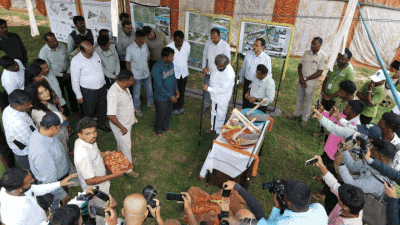- News
- City News
- bengaluru News
- India's largest Leopard Safari open to the public in Bengaluru
Trending
India's largest Leopard Safari open to the public in Bengaluru

The BBP, which is 30 kms from Bengaluru, already has Lion, Tiger, Sloth Bear and Herbivore Safari as part of its ex-situ conservation programme along with a zoo and rescue centre. In fact, the BBP has the largest concentration of carnivore animals among any zoos of India. The leopard safari has been developed on a 20-hectare area at a cost of Rs 4.5 crore and secured with railway barricades all around. The entire safari enclosure is covered by 4.5 metre height chain-link mesh and a 4.5-meter height flat rolled mild steel sheet at 30-degree inclination above the mesh to ensure leopards don’t stray out of the enclosure.
“Bannerughatta, dotted with several hillocks surrounded by dry deciduous and shrub forests, is an ideal habitat for leopards. Hence, the region is home to many leopards as per the previous estimation of their population. We have been hand-rearing leopard cubs abandoned in paddy and sugarcane fields and currently there are 14 such leopards at the BBP,” Khandre explained.
Milk feeding centre for Jumbos
The minister named a jumbo calf that was born on January 26, as ‘Swaraj’. Currently, BBP has 26 captive elephants and every year two to three elephants are added to the herd—the highest for any zoos in India. “We have inaugurated a milk feeding centre for elephants built at a cost of Rs 10 lakh. Elephant calves that are three years old are separated from the adults and handed over to Mahouts to build a bonding. They will feed these calves and nurture them round the clock at these feeding centres,” the minister briefed. A crawl for the free movement of jumbo calves and a surveillance room for the Kavadis was also inaugurated.
The minister also opened a baby care room at Butterfly Park for the benefit of visitors who come with toddlers. The minister said that by December 2025, two more baby care rooms will be set up at the BBP. Linking the Zoo and Butterfly Park, the BBP has come up with a skywalk project and a foundation was laid by the minister. Besides, the park has also come with plans to set up two new outdoor enclosures for Emu and Rhea birds at a cost of Rs 50 lakh, hunting cheetah enclosure at a cost of Rs 1.5 crore, enclosure for hamadryas and olive baboon at a cost of Rs 1.5 crore and a large enclosure for Indian grey wolf at a cost of Rs 1.5 crore in the days to come.
Discounted sapling to Visitors
Suggesting that zoos should become educational centres along with entertainment hubs, minister Khandre advised the forest and BBP officials to distribute saplings of various tree species to every visitor at a discounted price. “It is of prime importance to educate visitors of the zoo, safari about trees that give us oxygen and encourage them to take one sapling of such trees when they return home from zoos and plant them in the neighbourhood. How farmers are given saplings, every visitor to the zoo must also be given discounted saplings,” Khandre instructed the forest officials. He also directed the officials to enable visitors to at least identify 10 species of trees.
End of Article
FOLLOW US ON SOCIAL MEDIA










